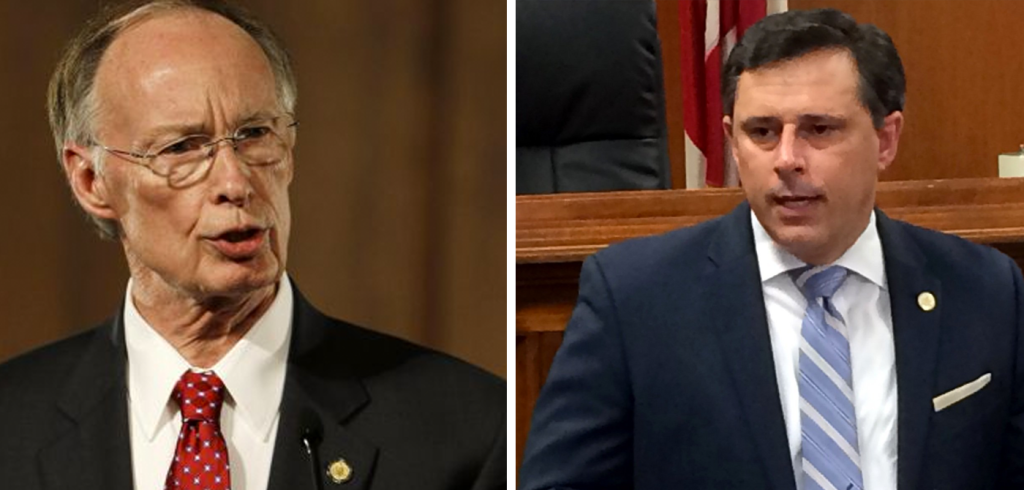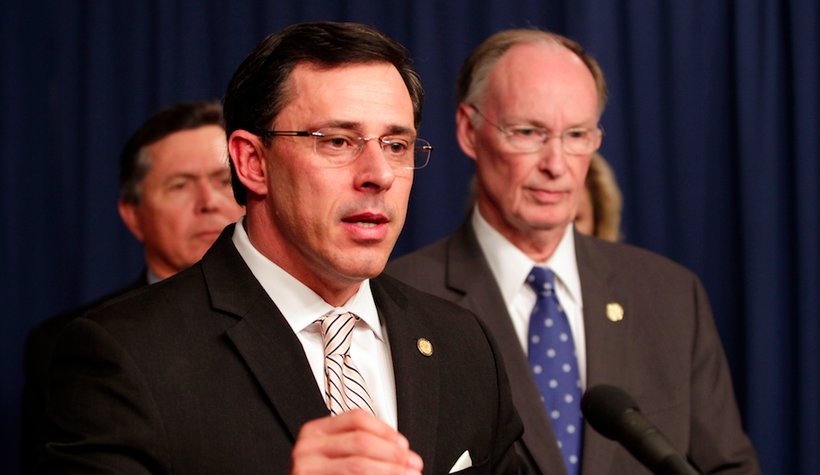John Archibald with Spencer Collier day of accident: correcting the record and why it matters

Earlier today we reported a story that last week Spencer Collier listed AL.com’s John Archibald a passenger in his car on the day of his 8/14/17 car accident on a new witness list in the Robert Bentley defamation case. I went on to talk about it on News Talk 93.1. Originally, we wrote that Archibald was a passenger in the car during the accident. That was incorrect. We updated this within moments of Archibald clarifying that he was not in the car during the wreck, but rather earlier in the day. Again, my apologies for the inaccuracy. That said, it doesn’t take away from the larger fact that AL.com did not report on the accident whatsoever. I want to reiterate that I believe the accident itself was newsworthy, and we still cannot find any coverage of this accident on AL.com. While— Times Daily, Lagniappe Mobile, Selma Times Journal, WSFA-12, Montgomery Advertiser, Decatur Daily, Alabama News Net all covered it. Over the past year and a half, since the day of the accident questions have continued about the cause of it, and from my vantage point Archibald has valuable information relevant to Collier’s state of being that day. Again, it is relevant that Archibald, a journalist who talks about the events of the day for a living, was with Collier. And questions linger: When was he with him? For how long? Was he lucid? Was he tired? All of which could be answered with this “good footage” from Archibald. Which is why I’m calling on John to answer those questions now and release the footage. Help us create a timeline of what happened, and give those of us who were not with Collier that day a small glimpse of what happened sometime before the accident. My back and forth with John on Twitter this morning: “Are you saying I was a passenger in Collier’s wreck? I was not. We filmed him in his cop car earlier in the day,” Archibald tweeted. Are you saying I was a passenger in Collier’s wreck? I was not. We filmed him in his cop car earlier in the day. — John Archibald (@JohnArchibald) January 30, 2019 “We are responding to a tweet that says you will “discuss the @JohnARchibald-Spencer Collier accident.” WTF?” Archibald tweeted. We are responding to a tweet that says you will “discuss the @JohnARchibald-Spencer Collier accident.” WTF? — John Archibald (@JohnArchibald) January 30, 2019 “You did,” said Archibald. You did: pic.twitter.com/hWjTKPjwb3 — John Archibald (@JohnArchibald) January 30, 2019 “My apologies for wording. Updated headline to reflect you were with him that day,” I replied. My apologies for wording. Updated headline to reflect you were with him that day — Apryl Marie (@aprylmarie) January 30, 2019 “And got some good footage, too,” Archibald replied. And got some good footage, too. https://t.co/DA9lW0XKj6 — John Archibald (@JohnArchibald) January 30, 2019 “We have updated that headline. To reflect an error was made,” I added. We have updated that headline. To reflect an error was made. — Apryl Marie (@aprylmarie) January 30, 2019
Spencer Collier lists AL.com’s John Archibald passenger day of accident on witness list in Robert Bentley case

Last week, a witness list was released in an ongoing defamation lawsuit filed against former-Gov. Robert Bentley by his former law enforcement chief Spencer Collier. Collier, who is currently the Selma police chief, sued Bentley in 2016. He contends the former Governor wrongfully fired him in March 2016 as secretary of the Alabama Law Enforcement Agency (ALEA) and then tried to discredit him with a sham state investigation. Flash forward to August 2017 and Collier was injured in a two vehicle car crash on Hwy 80 in Montgomery County that led to an investigation, since at the time of the crash Collier was driving an unmarked police SUV issued to him by the city of Selma. Ultimately Collier was cleared of any wrong-doing. After months of coverage on the suit, Alabama Today was tipped off this week to one glaring omission from all of the coverage written thus far: nestled 11 pages deep in a 12 page document, is one key fact: AL.com’s John Archibald was in the with Spencer the day of the wreck. “If any Defendant makes Collier’s wreck of August 14, 2017, an issue, Collier reserves the right to call any witness who has information of Collier’s condition on the day of the wreck including Selma Police Officers, the Selma PD Dispatcher, the Custodian of Records for the Selma PD and al.com columnist John Archibald who rode with Collier on the day of the wreck,” reads the subpoena. According to WSFA-12 the crash report revealed at around 7:45 p.m.: Collier’s vehicle was traveling east on U.S. 80 when it left the roadway, re-entered, then over corrected. Collier’s vehicle then began spinning before crossing the median and striking a second vehicle. The reports indicate Collier told investigators he did not remember anything about the crash or the events leading up to it. The driver of the second vehicle told investigators that when he realized Collier’s vehicle was starting to the cross the median, he hit his brakes and tried to take evasive action to avoid the collision. The report also shows investigators took a blood sample from Collier and submitted it to the Alabama Department of Forensic Sciences. In dozens of articles about the crash — Times Daily, Lagniappe Mobile, Selma Times Journal, WSFA-12, Montgomery Advertiser, Decatur Daily, Alabama News Net — we found no mention of Archibald being in the car with Collier that day. In fact, AL.com, who usually doesn’t miss a beat when it comes to covering everything happening in the state, did not cover the accident whatsoever. Out of 810 articles that mention Collier, there’s not a single one that talks about the car crash where one of their writers, who also happens to now be a Pulitzer Prize winner, was with Collier some time prior to the wreck. Here’s where things get interesting. While the crash is seemingly unrelated to Collier’s firing and subsequent lawsuit, the toxicology report also appears to significant to Bentley in the suit with Collier. In December 2017, the former Governor attempted to subpoena the reports from the Alabama Department of Forensic Sciences (ADFS). In addition to the toxicology results, Bentley also subpoenaed all documents related to the wreck and “any and all communications related to your investigation into Collier’s car accident… including without limitation any internal communications.” Archibald has further clarified in a tweet to Alabama Today that he was not in the car with Collier at the time of the accident, but rather with him earlier in the day. “Are you saying I was a passenger in Collier’s wreck? I was not. We filmed him in his cop car earlier in the day,” tweeted Archibald. Are you saying I was a passenger in Collier’s wreck? I was not. We filmed him in his cop car earlier in the day. — John Archibald (@JohnArchibald) January 30, 2019 See the full subpoena below: *Headline and article have been updated to reflect John Archibald were not in the wreck together. Rather Archibald was a passenger in Collier’s car that day.
Judge orders mediation in Robert Bentley lawsuit

A judge has ordered mediation in a defamation lawsuit filed against former Alabama Gov. Robert Bentley by his former law enforcement chief. Al.com reports that Montgomery Circuit Judge Greg Griffin on Monday ordered the two sides to attempt mediation. Spencer Collier sued Bentley in 2016. He contends Bentley wrongfully fired him as state law enforcement secretary and then tried to discredit him with a sham state investigation. Bentley had contended Collier was dismissed for cause. A day after being fired, Collier publicly accused the governor of having an inappropriate relationship with an aide before his divorce. Bentley resigned in 2017. Griffin appointed mediators to work with the two sides. The case is scheduled to go to trial in September. Republished with permission from the Associated Press
Judge sets March trial date for suit against former-Gov. Robert Bentley

Montgomery Circuit Judge Greg Griffin has set a March trial date for a lawsuit filed against former Alabama Gov. Robert Bentley by his former law enforcement chief Spencer Collier. According to the Associated Press, the trial is set for March 4. There, Collier’s team will argue he was wrongly fired by Bentley. The suit was filed in April 2016. The day after Collier was fired he accused Bentley of having an affair with an adviser Rebekah Mason. He alleges that Bentley and Mason made misleading statements to the media in an attempt to try and discredit him. “Their lies have hurt me financially, have severely damaged my reputation and they have made it their mission to permanently end my career in law enforcement,” Collier said in a 2016 statement. The lawsuit named four other defendants besides the Bentley campaign (Bentley for Governor, Inc.) Gov. Bentley himself, new ALEA Secretary Stan Stabler, Rebekah Mason, and the group through which she was paid, the Alabama Council for Excellent Government. Bentley ultimately resigned in April 2017, following allegations he used state resources to cover up an affair with Mason. Nevertheless, he continues to maintain his innocence saying Collier was fired with “cause.”
In governor’s race, issues of age, health and forthrightness

Gubernatorial challenger Walt Maddox’s introductory television ad aimed to convey crucial details to voters. He described rebuilding tornado-ravaged Tuscaloosa as the city’s mayor and called his politics “pro-life and pro Second Amendment.” He also emphasized his age. “I’m Walt Maddox. I’m 45 years old,” Maddox said at the ad’s start. In Alabama’s race for governor, the issue of age and health has awkwardly rippled as an undercurrent as the 74-year-old incumbent Gov. Kay Ivey faces the 45-year-old Democrat. In the GOP primary, Ivey’s younger male opponents challenged each other to release their medical records and said the state needed a governor with energy and stamina while simultaneously maintaining that they weren’t directly questioning Ivey’s health. The undercurrent — and along with it accusations of secrecy and malfeasance — burst to the surface Tuesday. The state’s former top law enforcement officer came forward with claims that Ivey was hospitalized for stroke-like symptoms during a state trip three years ago and that her office directed the trooper not to tell superiors. Ivey adamantly denied the accusations, saying she had altitude sickness and releasing a letter from her doctor. Spencer Collier, who served as the state’s top law enforcement officer at the time, told The Associated Press Tuesday that the trooper traveling with then-Lt. Gov. Ivey reported to his commanding officer that Ivey developed stroke-like symptoms during the trip and had a transient ischemic attack. “The trooper noticed that she was incoherent and made the decision to transport her to the emergency room,” Collier said. “Initially, I was told when they brought her to the hospital it was stroke-like symptoms. In the following days we were briefed it was a TIA,” Collier said. TIA is shorthand for transient ischemic attack. According to the American Stroke Association, a transient ischemic attack is a temporary blockage of blood to the brain, caused by a clot or blockage and is sometimes referred to as a mini-stroke or warning stroke. During the 2015 incident, Collier said the trooper also reported that Ivey’s chief of staff, Steve Pelham, had directed him “not to tell anyone, including his chain of command.” Collier said Ivey also later asked to have the trooper reassigned. Collier said he was not attacking Ivey’s health, noting he himself had health problems. He said he was more concerned about the instructions to the trooper to hide the matter. “Don’t take it lightly when you instruct troopers not to tell the truth,” Collier said. Pelham now serves as Ivey’s chief of staff in the governor’s office. Ivey told reporters Tuesday evening that she had “altitude illness” and released a letter from her doctor. “The letter I released today from my doctor clearly confirms what I’ve been saying all along that I’m in good health,” Ivey said. Dr. Brian Elrod said he was aware of the hospitalization and examined her a day after her discharge. “During my examination I saw no evidence of a transient ischemic attack and learned that the extensive work-up done at the Denver hospital, including an MRI, a carotid ultrasound and labs were all negative,” Elrod wrote. The letter did not say how long she was in the hospital. Elrod said he could not confirm what condition led to the hospitalization, but said he considers Ivey to be low risk for a cardiovascular event. Ivey spokesman Daniel Sparkman disputed the claim that the trooper was told not to tell his superiors. “The answer is: No… Besides, there was nothing to cover up,” Sparkman wrote in a text message. Collier said he would be willing to take a polygraph to show he is telling the truth. He said the matter was also reported to the division chief over dignitary protection and then-Gov. Robert Bentley. Bentley did not respond to a message seeking comment. Efforts to reach the division chief and trooper were unsuccessful. The two campaigns took swipes at each other. “Like most Alabamians we were shocked to learn that Governor Ivey possibly had a stroke and attempted to cover it up. We are examining all the available information and Walt will have more to say very soon,” the Maddox campaign said in a statement issued Wednesday. Ivey on Tuesday blamed the Maddox campaign for the Collier accusation. “It’s plum sad that Mayor Maddox’ campaign is pushing this issue out just three weeks before an election,” Ivey said. “It makes me have to assume Mayor Maddox is desperate because his liberal record is not connecting with Alabamians,” Ivey said. Throughout the primary, Ivey has alternately bristled to questions about her health or responded with folksy humor that age brings wisdom. In a speech at the University of Alabama’s football stadium, she suggested her experience was a good thing. “The state of Alabama is looking for a head coach. I’m the only person applying for the job who has actual experience coaching at this level,” Ivey said, adding “who would ever consider somebody who’s never coached a single game at this level to be head coach,” Maddox in similar football-themed retorts has suggested the state would fire a coach with the state government’s record. Republished with permission from the Associated Press.
Forget Ivey’s age and health, what should concern you is her staff

Yesterday, Bill Britt over at Alabama Political Reporter dropped what was intended to be a bombshell story about Gov. Kay Ivey‘s health and details about the cover up of her hospitalization in Colorado for what former ALEA Chief Spencer Collier described as “mini-strokes.” The stroke accusation was quickly disputed by her doctor in a letter that raised as many questions as it gave us answers. Here are my thoughts on the whole mess: 1) Voters don’t care. Ivey is beloved in the state. Don’t believe me? Look at her favorability numbers. Understand that coming from previous administrations where some could say most of the men in recent years had behavior that was not just unethical, but sometimes criminal, Ivey is doing great. That said, I’m not sure what the continued discussion about her age or health is hoping to accomplish. Democrats were never going to vote for her. Her base is likely to be more sympathetic to her given the constant attacks, and then there’s that whole issue of math. So long as we’re in Alabama and so long as she doesn’t have a Roy Moore-style scandal in the next several weeks, she’s going to win on Nov. 6. Being sick wouldn’t qualify for the type of scandal it would take to make a difference. 2) The real story in this story is the demotion/transfer of Trooper Drew Brooks and any effort by her staff to engage in a cover-up, no matter what they were trying to cover up. You’re really, really missing the point if you read that story and your take away is “she’s not healthy enough to be governor.” Ivey’s real problem, and this is something I’ve been talking about since she took over in the governor’s office, is the staff. They screw up the basics of their job. I know, I know I’m suppose to say they’re there for the people of Alabama, but let’s be honest they’re there to make Ivey look good. It’s that simple. They have pretty easy job. Yes, the governor makes tough decisions, but at the end of the day what voters look at is the image that is portrayed by the media, her appearances, her surrogates, what her administration is doing. Her staff just needs to wrap-up her accomplishments in a pretty little package with a bow and get out of the way so that they don’t give reason to the press, or others, to write or report bad things. If you’re the staff and you’re the story for your screw-ups — you’re failing. I’ve never in my life seen an office, including Robert Bentley‘s so bad at cover-up, lies and outright laziness. Some on her staff are completely out of control and that ladies and gentleman should be the story we’re talking about. I’m all for keeping Ivey as our governor (sorry I’m a tried and true small government/fiscally conservative republican Walt and his big government agenda isn’t my cup of tea) but can we vote her staff out? 3) How do we not start an investigation into the potential misuse and abuse of the security detail? If reports are to be believed, the executive security detail in both the Bentley and Ivey administrations have become the whipping-boy of power-hungry individuals — Bentley himself, and in this case it looks like Ivey’s Chief of Staff Steve Pelham (despite his previous statements to the contrary). This is sad and should be handled not through media reports, rumors and gossip but through a professional unbiased investigation. The executive security detail has a very simple mission: protect the governor and lieutenant governor. It’s not challenging to understand even if staff would want the agents to be political lackeys they’re not. Their sworn law enforcement officers not babysitters, secret keepers, errand boys/girls. They assess threats on the ground when their principles are moving around the state or even within their offices. They also assess threats we don’t see or know about those that are called, emailed or snail mailed in. Just out of college, I briefly worked in the Florida governor’s office handling the governors travel schedule (a job not for the faint of heart or those who ever wish to have a life of their own). This job allowed me to see the interworking of all the offices and roles within the executive office of the governor and how they interacted with the law enforcement tasked with the governor and lt. governors safety. Those Florida Department of Law Enforcement officers were tremendous. I can’t imagine the ALEA officers are anything less. They travel frequently and leave their homes and families, work crazy hours. It’s a tough job. It’s tough enough to do without power-hungry staffers asking you to lie and transfer you for refusing to do so. While others may be focused on the potential implications of health scares, which won’t get us anywhere, I’m asking for folks to focus on the abuse of power and the potentially unfair transfer of law enforcement officers as retaliation for things not associated with their jobs. And if the reason for relocation was true, he tried to hack her email, that’s more of a fireable offense. We need a full, unbiased investigation into all of the actions surrounding this incident. As for the governor’s office. Stay tuned in the coming days I’ll be posting more about my efforts to hold Ivey’s staff accountable for the transparency she promised but that they aren’t delivering on.
Arrest warrant issued for Selma city councilman charged with public lewdness

An arrest warrant was issued on Thursday for a Selma city councilman. Councilman Samuel Randolph, who represents the city’s Ward 5, is being charged with public lewdness according to Selma Police Chief Spencer Collier. WFSA reports, “In Randolph’s case, the charges stem from an April 1 incident on Broad Street in which several narcotics officers were on a surveillance detail when they observed the councilman stop his vehicle. The officers reported Randolph then got out of the car, appeared to expose himself, relieve himself, and urinate in public.” Authorities are now urging the councilman to turn himself in and face the Class C misdemeanor charge, which Collier says can carry a sentence of up to a year in jail. “We are not talking about a murder here or a serious assault however we are talking about something that shocks the conscience. I have children. I don’t want my children driving down the road and seeing a grown men relieving themselves on the side of the road,” Collier told WFSA.
Robert Bentley paramour Rebekah Mason behind effort to shut DMV offices in black counties, new report shows

Rebekah Mason, Gov. Robert Bentley’s former top adviser and illicit lover, pushed to close 31 offices of the Alabama Department of Motor Vehicles in mostly black counties. After protests by civil rights activists, including Jesse Jackson, the politically motivated effort was later overturned, resulting in a federal investigation. The relationship between Bentley and Mason and how it impacted the DMV closure plan was the focus of a new 131-page report, which the Birmingham News reports was released by investigators examining impeachment proceedings against the governor. The report, from lead investigator Jack Sharman, found Mason “proposed closing multiple driver’s license offices throughout the State” and asking Alabama Law Enforcement Agency to “put together a plan.” Sharman also noted that former ALEA head Spencer Collier – well-aware of Mason’s intent – was instructed to have a plan “rolled out in a way that had limited impact on Government Bentley’s political allies.” Collier reported the closure plan to Luther Strange, Alabama’s then-Attorney General, expressing concern over possible Voting Rights Act violations. The News reports that Collier eventually agreed to the closure plan, but through “objective measure based on processed transactions per year to determine which offices to close.” Mason’s plan, if enacted, would of save the state $200,000 – a small amount in a General Fund showing typical annual shortfalls between $100 million and $200 million. Bentley agreed to the plan, the report said, with a single exception: removing state Sen. Gerald Dial’s district from the list. Dial told the News he never spoke with Bentley about any closures and is not aware of which county was under consideration. The plan set off an investigation by the U.S. Department of Transportation, which discovered that the closures would hit rural counties hardest and disproportionately affect black neighborhoods, a violation of the 1964 Civil Rights Act. The NAACP, the nation’s leading civil rights organization, filed a lawsuit prompting the federal review. At first, Bentley was critical of DOT involvement in the investigation, which he said was political in nature. But after striking an agreement between state and federal agencies, ALEA agreed it would extend service hours for DMV offices in Alabama’s so-called “Black Belt.”
Former ALEA Secretary adds defendants to termination lawsuit

Spencer Collier, the former secretary of the Alabama Law Enforcement Agency (ALEA) has amended his wrongful termination lawsuit against Governor Robert Bentley and others. Filed on Wednesday, the complaint names an attorney for ALEA Michael Robinson and ALEA special agent April Bickhaus as two new defendants. Five new counts are also listed in the complaint. The amended documents claim Robinson and Bickhaus were part of an effort to smear Collier. The five new counts are as follows: Count X accuses Bentley, Rebekah Mason, Stan Stabler and Robinson of conspiracy, alleging that they worked together to place Collier “in a false light and to falsely accuse him of crimes and other misconduct,” damaging his reputation in order to discredit his testimony as a potential witness against Bentley and others. Count XI is an invasion of privacy claim that states the false information and statements published were done so to intentionally hurt Collier and invade his privacy. The lawsuit says the statements were “made and published with malice and with knowledge and intent to hurt and discredit Collier.” It further says “Bentley grossly abused his position and committed Ethics Violations by using State equipment, facilities, time, materials, human labor, and other public property for his private benefit and personal desires to hurt Collier and damage his reputation.” Count XII claims Robinson used his job to “intimidate and coerce ALEA employees to make false and derogatory statements against Collier.” Count XIII accuses Bickhaus of an invasion of privacy. The lawsuit states that she “invaded Collier’s privacy by putting him in a false light and position in the eyes of the public by among other things, placing false and disparaging information in the ALEA Reports.” The claim also states that Bickhaus knew there was no “legitimate” purpose for the investigation. Count XIV accuses Bentley and his staff members, “at [the governor’s] direction”, of publicly accusing Collier of committing crimes, while knowing the accusations were false. View the amended suit below:
Robert Bentley turns over ALEA report criticizing Spencer Collier for absenteeism, spending

Gov. Robert Bentley turned over a 1,600-page filing with a committee looking into his impeachment last week, which included a 63-page report criticizing former Alabama Law Enforcement Agency (ALEA) director Spencer Collier‘s job performance, offering new insights into his March 2016 firing. The report was the product of a months-long investigation by April Bickhaus, a special agent with ALEA’s Integrity Unit, which she began in February 2015. It includes quotes from ALEA employees and paints a picture of habitual absenteeism, a misuse of state funds and mismanagement in the office, and poor hiring decisions. It also included allegations of sexual harassment, prescription drug abuse, and falsifying time sheets. Among its findings, the report claims upon review of entry records, Collier’s key card was used to access the ALEA’s Montgomery headquarters only 20 days in the six-month period before his termination. It also indicated a problem with the amount of weapons Collier purchased, and the process in which he did so. “Weapons stand out to us because this particular individual bought a lot of weapons, more than the average employee,” the report quotes ALEA Accounting Director Jennifer Frost having said. “For him to just go to Gulf States (Distributors) and buy weapons and accessories without a (purchase order), and purchase these items through the ALEA account held at Gulf States is clearly wrong.” Collier, who said allegations Bentley used state funds to pursue an affair with former senior aide Rebekah Caldwell Mason led to his investigation, denies the charges made against him in the report. “This is probably the sleaziest politics that I have ever seen,” Collier said in a statement. “One witness in this report has recanted and others will. Stan Stabler and Michael Robinson threatened employees, lied to them and intimidated them to say whatever was needed to fit the narrative.” Read the entire ALEA report below:
Jim Zeigler not pleased taxpayers paying for Robert Bentley’s prosecution, defense

Alabama taxpayers will be paying for both prosecuting and defending Gov. Robert Bentley, who faces a grand jury and possible impeachment over charges he abused the office. State Auditor Jim Zeigler is not pleased. “This Friday, a special counsel will be hired at taxpayer expense to handle the impeachment investigation of Bentley,” Zeigler said in a statement. Ziegler announced that the state had approved a contract last week for up to $200,000 — paid with taxpayer money — to defend Bentley in a lawsuit filed by former Alabama Law Enforcement Agency head Spencer Collier. Bentley fired Collier in March, accused him of misusing funds during his time as ALEA secretary. Nevertheless, Bentley offered no proof of impropriety. Collier is arguing his dismissal was in retaliation for signing an affidavit setting the Attorney General’s office had not leaked information in the trial of former Alabama House Speaker Mike Hubbard. Currently, the governor is the target of four separate investigations: The Montgomery County grand jury, the state ethics commission, the House Judiciary Committee, and the U.S. attorney for the Northern District of Georgia. “We taxpayers are catching it from both ends,” Zeigler explained. “It is going to be costly to try to remove the governor. The only thing that would be even more costly would be to keep the governor for 2 ½ more years, misusing public resources.” Bentley, who is term limited, is at the midway point of his second term. Unable to seek a third term, he will leave office in January 2019, after the 2018 election. “At some point, Alabama citizens will get completely fed up with the Bentley soap opera and want it resolved,” Ziegler said. “We are close to that point. People do not want to wait for a legislative process that could last most of Bentley’s remaining term.” Ziegler called for Bentley’s resignation, saying, “It would save the state a lot of time and money.
Robert Bentley called before special grand jury

Acting on orders from Alabama Attorney General Luther Strange, Montgomery County Circuit Judge Gene Reese ordered a special grand jury to convene this week to investigate the firing of former Alabama Law Enforcement Agency Secretary Spencer Collier by Governor Robert Bentley. Collier was fired by Bentley in March for allegedly misusing funds in his role as ALEA secretary. The special grand jury was impaneled on Monday, July 11. Multiple sources confirm, Ray Lewis, the former head of Bentley’s security detail, testified Monday and Tuesday. Bentley himself testified to the grand jury Wednesday, followed by Hal Taylor, the former Chief of Staff to former Alabama Law Enforcement Agency Secretary Spencer Collier and current ALEA head Stan Stabler. “At 8:39 am, Wednesday, Gov. Robert Bentley walked into the Special Grand Jury being held in Montgomery County as Alabama Political Reporter reported yesterday. Bentley’s entourage included legal counsel David Byrne and one of his personal attorneys, Bill Espy,” the Alabama Political Reporter reported in an article published on Thursday. The Attorney General’s Special Prosecutions Division, under the direction of Division Chief Matt Hart — who most recently made headlines for successfully prosecuting and convicting former House Speaker Mike Hubbard — is handling the investigation.

